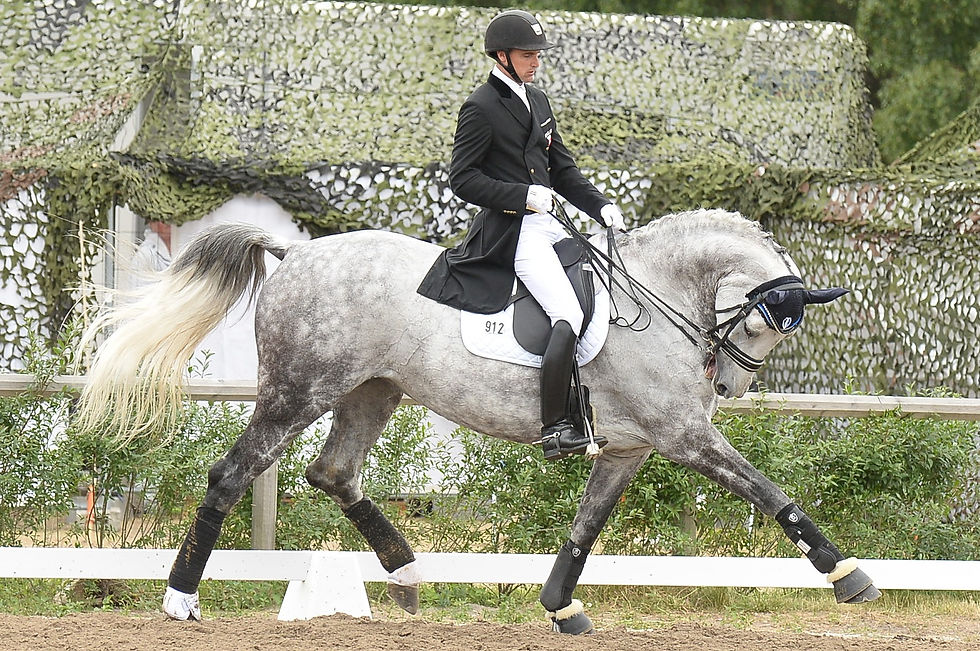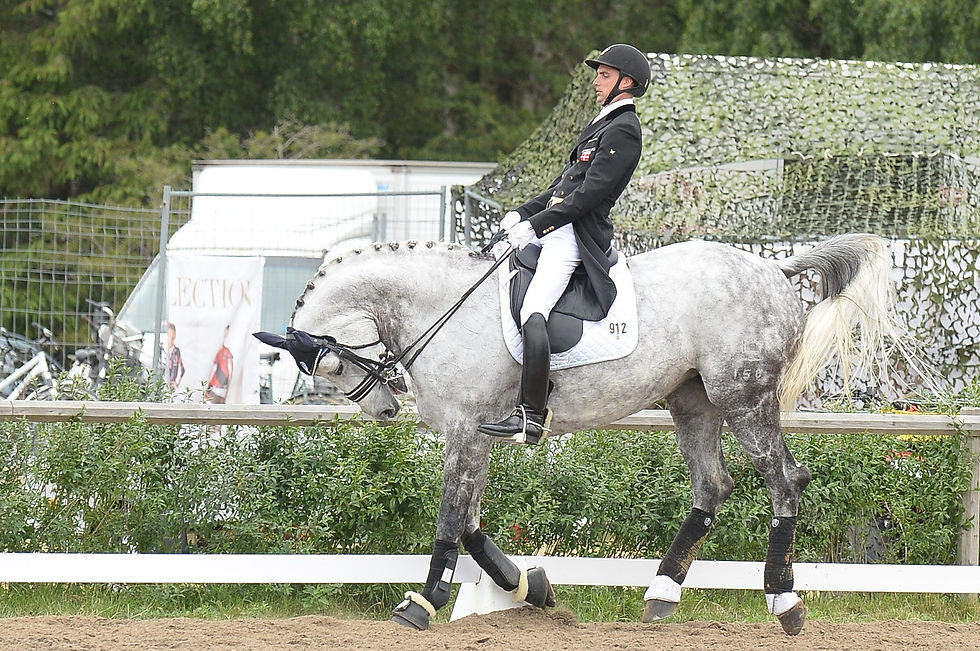
In July, the traditional Falsterbo International Horseshow took place as usual. These photos are of Tørveslettens Stamina who has replaced Akeem Foldager as Andreas Helgstrand's premier Grand Prix horse. The pair took part in the FEI Longines Nations Cup dressage and the Danish team came 4th. These photos (scroll down for link to all photos) were taken over two days in Falsterbo and sent to us by photographer Crispin Johannessen.
Why is it necessary to publish these photos? We think it's because they tell us something about where horses find themselves in relation to equestrian federations, the legal systems, animal protection charities and other people and entities who have taken it upon themselves to be guardians of equine welfare. Are they really up to the task? And are they happy with the new normal represented by these photos?
Article continues below photos.




No yellow cards were given out in Falsterbo this year. Chief Steward Eva Wiklund saw no reason for it. She must have found this riding unforced and non-aggressive, since forced and aggressive use of the reins to induce hyperflexion is banned by the FEI and should cause the steward to intervene. We'll ask Eva Wiklund how she distinguishes between what we see in the photos and the banned kind of hyperflexion which relies on harsh rein aids.
We'll also ask the FEI whether this is really what it looks like when the horse's welfare is paramount as the federation's code of conduct demands.
Edited Thursday, August 27 at 16:38 CET to add comments from FEI Secretary General Sabrina Zeender:
“The FEI finds these images extremely disturbing. We are very concerned about this incident and we are investigating it thoroughly. We have already contacted the Chief Steward at Falsterbo to ask for a full report specifically on this issue, in addition to the normal event report that has already been sent to the FEI.
“The Danish National Federation has also informed us that they will be investigating the matter and will ask for a report from the rider Andreas Helgstrand and the FEI Steward.
“The FEI Dressage Committee is also looking at ways to ensure that the rules work more effectively to protect horse welfare and that they are enforced more strenuously by our officials.
“The issue will be discussed at the Dressage Committee meeting next week and will also be raised at the meeting with our stakeholders’ group, which includes representatives from the riders, trainers, officials and organisers clubs. It will be the main discussion point at the next meeting in the coming weeks.
"The FEI has horse welfare at the core of everything we do, and we cannot allow misinterpretation of the rules – whether deliberate or inadvertent – by any member of our community.”
We'll of course be asking Andreas Helgstrand if he's happy with his riding in the photos.
Edited Sunday, August 30 at 13.22 CET to include comments published by Helgstrand Dressage
"I have received a message from an independent journalist and photographer, Kim Lundin, who sends these photos."
(The original link to the photos no longer works, so we have removed it from this article. But the 8 photos showed Tørveslettens Stamina not being hyperflexed and were supposed to prove that Johannessen's photos were misleading.)
"Neither in the warmup or anywhere else during the show in Falsterbo was I contacted by a steward, official, technical delegate or ground jury who are otherwise monitoring the warm up constantly during a give star FEI show, such as this.
Today, I have asked the FEI for a copy of the "normal event report" which, according to media quotes from high ranking FEI employees, has long since been handed in to the FEI, so that I can see whether, despite the fact that nobody has contacted me, some criticism has been filed with the show authorities.
Stamina is an incredibly supple horse who, naturally and immediately the rider has mounted, goes in a flexed dressage posture. The horse can be ridden in a snaffle or on a completely loose curb rein with no problems. For this reason, I always ride it during training and at shows on a baby double bridle.
If it were permitted to ride the high level classes without the double bridle, I would gladly show Stamina on a snaffle, even in the hardest movements."
Added Thursday, August 27 at 15:22 CET:
According to an interview with Ridehesten.com, Helgstrand found Stamina to be on top of her game ahead of the Grand Prix classes in Falsterbo:
"She has schooled well in the showgrounds and has just passed the veterinary control. She has taken it all in her stride and I am very satisfied with her. She develops all the time and now I am certain she can be among the best Danish team horses."
According to the article, "Stampy" was "positive" and "fresh" before her first start in Falsterbo.
We'll be asking the Danish and Swedish animal welfare charities what they think of the photos. Danish Animal Protection Society Dyrenes Beskyttelse claims to be trying to get politicians to completely ban hyperflexion. We'll ask them how that's going.
Danish horse protection agency Hestens Værn has previously criticized those who reported Andreas Helgstrand to the police for animal cruelty. We'll be asking Hestens Værn how they think their own strategy of "engaging Andreas Helgstrand in a dialogue about humane riding" is working out for the horses in his care.
Edited Friday, August 28 at 16:30 CET to add questions to and answers from horse welfare groups Hestens Værn (Denmark) and Djurens Rätt (Sweden)
Do you at Hestens Værn think that the double bridle is being used correctly in the photos?
"The photos are cause for concern because what we see in the photos is not good horse welfare and shows obvious conflict behaviour in the horse. This should be kept to a mininum during competition as well as during training.
Hestens Værn believes that all organisations involved with horse sport should work towards minimising harsh and incorrect use of equipment and that the rules and their enforcement should support this aim. We recommend contacting the show organisers or officials in situations where it is felt that a horse is subjected to harsh riding. This way the act can be stopped immediately, which is in the interest of the horse's welfare."
How do you at Hestens Værn feel that your chat with Andreas Helgstrand about the correct fitting and use of equipment following the Akeem Foldager scandal last year has served the other horses in Andreas Helgstrand's care?
"Hestens Værn still believes that dialogue is important. Vi generally do well with using constructive diaglogue for putting focus on the problems. This applies both in cases of neglect and abuse.
In severe cases where dialogue is not working, we escalate to vet visits in order to resolve the matter and ultimately it may be necessary to file a police report."
Do you still believe at Hestens Værn as you did after the Akeem Foldager scandal that Andreas Helgstrand's riding is "far from abuse"?
"In the photos, the horse is displaying clear conflict behaviour and that is not good horse welfare. We cannot, based only on the still images, tell if horse abuse is occurring and therefore a violation of the law. If this was not just one moment in time, officials should have intervened during the event. We will investigate further and contact Andreas Helgstrand.
Hestens Værn will encourage the Danish Equestrian Federation and the FEI to ensure that the judging both in the warm up arena and the competition arena is in order. Nobody should be in any doubt that horsemanship and sportsmanship give the greatest pleasure when interacting with a horse."
Comments from Djurens Rätt, Sweden:
Do you at Djurens Rätt think the double bridle is being used correctly in the photos?
"The simple answer to that question is; NO! The more extended answer is that there is hardly any way to use a double bridle correctly. This type of heavy armour has no place in the mouth of a horse in our opinion."
Are there any Swedish animal protection laws which guard horses against this type of riding?
"Our law says that you cannot use equipment that harms the horse in any way. The law also forbids all kinds of suffering associated with competing. However these laws are card houses in our opinion. There is really no debate on government level in these matters."
What kind of signals does it send to young riders and other amateurs when this is the type of riding which gets you to the top in the sport?
"This is nothing but sad and has nothing to do with good horsemanship and communication. In our opinion this type of riding has no place in the equestrian world. The message to young riders from the FEI is very strange if this type of riding is representative for the dressage sport."
Edited Thursday, August 27 to add response from the Danish Equestrian Federation:
"We have examined the roughly 60 images which show the horse and rider in various warm up situations over two days. The number of photos and the fact that they depict several different training sessions gives us the impression that the horse is clearly expressing conflict behaviour and there is a lack of harmony between the horse and rider which is not in accordance with good horse welfare. Horse welfare is a key area for us and we have a clear expectation that our horses and riders can deliver warm up and a performance which is aligned with good horse welfare. We also expect riders to be able to evaluate whether a horse's education and training has prepared it for the task of the day in question.
We wish to investigate this matter further and therefore, we will be asking for explanations from both Andreas Helgstrand and the responsible FEI steward. If there is video documentation of the warm up sessions in question, we would also like this to be sent to us"
Andreas Helgstrand is currently on watch for two years after having been found to use a double bridle incorrectly in 2014 during a stallion show.

The ongoing discussions around horse welfare in equestrian sports remind me of the rice purity test, where certain actions can reveal deeper truths about one's character. Just as the test prompts reflection on choices and behaviors, the scrutiny of riding practices pushes us to consider the ethical responsibilities we hold towards the animals in our care. It's crucial that we uphold the highest standards of welfare and integrity in all aspects of equestrianism.